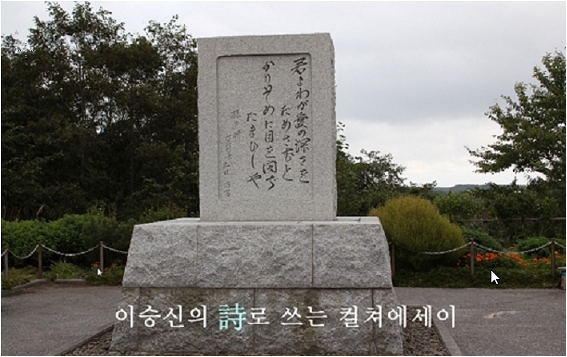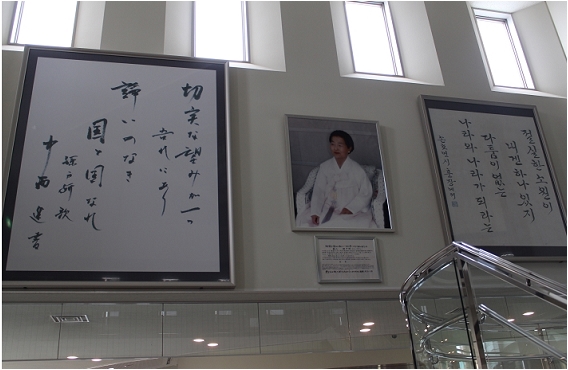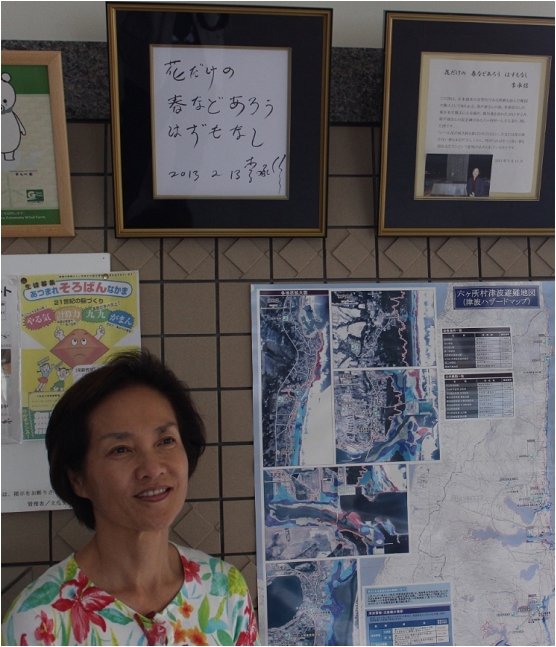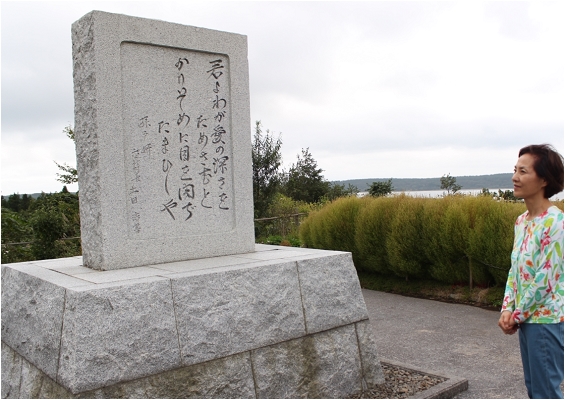My Dearest
My Dearest did you close your eyes on purpose to measure the depth of my love
This is the Poem of my mother, Son Hoyun, carved in the poem Monument in Aomori Japan.
One day, an adviser of the Japan Business Federation sent her a message by fax that they hope to set up Son Hoyun poet’s poetic tablet. Moved by a column on Nikkei daily newspaper by Kitade Akira, an author of Mother’s biography, he said, he recites the poem mentioned above.
My petit-physique mother got worried at first. She thought somebody in Japan is trying to sell some land or a stone.
The adviser, Nakazawa, who speaks the most frequent English among all the Japanese I have ever met and is of cheerful character, however, was being sincere. He inquired here and there in Tokyo, where my mother used to study in 1940s, only to confront various regulations. One of the strong candidates was Hibiya Park in the center of Tokyo, a historical site located between the Imperial Palace and the Imperial Hotel. It turned out, however, that it was not an appropriate site to keep a good maintenance of a poetic tablet.
After many complications, Nakazawa thought of Aomori, where the company he used to represent for more than twenty years is located. President Tsukuda, a leader of local community was pleased to offer a part of his broad acres. It was a great location with ocean view.
In June of 1997, Mother’s poetic tablet was thus erected at a place in Aomori with a view of the Pacific Ocean. Whenever Japanese offer various events appreciating her poetic turn of mind, although she composed her Tanka only in Korea during her lifetime, Mother felt apologetic.
Aomori situated in the furthest northern part of Honshu, the main island of Japan. This is my answer when people ask why Mother’s poetic tablet is located in Aomori of all places.
In Aomori, snow lay several meters thick in winter, and one could enjoy skiing the latest. It is a place where one could see belated spring flowers and visit Tanka Museum of Literature.
In Akita city of Akita Prefecture, there was a music concert, in which my poem was composed into a song by a Japanese composer. Since Aomori is neighboring to Akita, I had a plan to take a train to Akita after visiting the poetic tablet. It was rather more expensive to book a round trip flight ticket between Kyoto and Aomori with a short visit from Aomori to Akita by train and bus inbetween than a flight ticket between Seoul and Aomori. This is one of the reasons why Japanese do not usually plan domestic travel.
As if it were my mother’s body, the poetic tablet still stood there. Ever since the poetic tablet was installed, Mother attended the events every year and I also accompanied her. It was my first time after visiting the place with a KBS team four years ago.
I still have a vivid memory standing there next to my mother. Right behind the poetic tablet, we buried Mother's precious manuscripts and keepsakes of hers and my father's in two time capsules, which will be opened in 100 years. We put down a flowerpot of cyclamen, gazed at the poetic tablet together, checked on the ten Mugunghwa trees my mother had brought from Seoul and planted, and looked upon the ocean in front.
We used to enjoy together a hundreds-year-old Onsen. Once we stayed at six-hundred-year-old house that is only open for Japanese Emperor who visits once a year. There was also a time when Mother’s friends and students accompanied us. I can still vividly picture her graceful figure in Korean traditional clothes, with her flushed cheeks as if she were a little girl, bowing elegantly at the stage of the Culture Center at the opposite side of the poetic tablet.
It never occurred to me, then, that Mother would not be with me on this earth one day. I feel so lonely to realize that I can no longer gaze at the wonderful poetic tablet with my mother, the one much taller (good over 2 meters) than the ca. 70cm long ones of Poet Yun Dong-ju and Cheong Ji-yong set up by Korean Community at Doshisha University.
The poem carved upon this tablet is one of her love poems she poured out after several years of her break after my father passed away, published as Mugunghwa IV, which greatly moved the hearts of Japanese. She was recognized in Japan only about half a century later since she had begun her poetic career and not at all known in Korea at that time.
As if the case of my father, I wonder if she might have disappeared for awhile just to test the depth of my love for her. I wonder if she would be squinting at me to see if I am crying in sorrow or not when she passed on as such.
I have seen some ads on Aomori tours on the newspaper. Once I have dialed the number on the ad and, out of curiosity, asked how many Koreans are actually going for a tour in Aomori. The answer was that it is actually a fairly popular tour package. I could imagine why because Aomori is a perfect site for quiet healing, well known for its clean air and water, outdoor hot-spring sites overviewing the long Oirase Mountain Streams, lakes and cascading waterfalls, and its nationwide popular apples.
I inquired the travel agency if they knew about the poetic tablet of a Korean poet in Aomori and the answer was no. I have seen some people who have accompanied me to Aomori being touched not only by the beauty of Aomori's nature, but also by the fact that Japanese had set up a poetic tablet as a tribute to the poetic spirit of their neighboring country.
I believe that the days will come soon, when many more Koreans will be standing in front of the poetic tablet and deeply moved and inspired.
Mingled with the foreign earth let it stand the poem monument as a bridge of soul between two countries
Son Hoyun
The portrait of the poet and her poem of peace in Japanese and Korean hanging up high at the lobby of the Culture Center opposing the poetic tablet
A line of poem & its origin by Lee Sunshine hanging up in the Culture Center, Aomori
View of pacific ocean beyond the Mother's Poem Monument - Sept 26 2015
|









